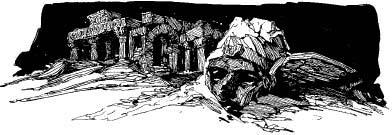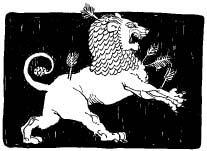The Savage Tales of Solomon Kane (52 page)
Read The Savage Tales of Solomon Kane Online
Authors: Robert E. Howard,Gary Gianni

Kane came to the black slaves and after some difficulty released them.
“Take up these weapons which the warriors dropped in their haste,” said he, “and get you home. This is an evil place. Get ye back to your villages and when the next Arabs come, die in the ruins of your huts rather than be slaves.”
Then they would have knelt and kissed his feet, but he, in much confusion, forbade them roughly. Then as they made preparations to go, one said to him: “Master, what of thee? Wilt thou not return with us? Thou shalt be our king!”
But Kane shook his head.
“I go eastward,” said he. And so the tribespeople bowed to him and turned back on the long trail to their own homeland. And Kane shouldered the staff that had been the rod of the Pharaohs and of Moses and of Solomon and of nameless Atlantean kings behind them, and turned his face eastward, halting only for a single backward glance at the great mausoleum that other Solomon had built with strange arts so long ago, and which now loomed dark and forever silent against the stars.

The Children of Asshur
(Fragment)
The Children of Asshur

I
Solomon Kane started up in the darkness, snatching at the weapons which lay on the pile of skins that served him as a crude pallet. It was not the mad drum of the tropic rain on the leaves of the hut-roof which had wakened him, nor the bellowing of the thunder. It was the screams of human agony, the clash of steel that cut through the din of the tropical storm. Some sort of a conflict was taking place in the native village in which he had sought refuge from the storm, and it sounded much like a raid in force. As Solomon groped for his sword, he wondered what bushmen would raid a village in the night and in such a storm as this. His pistols lay beside his sword but he did not take them up, knowing that they would be useless in such a torrent of rain, which would wet their priming instantly.
He had laid down fully clad, save for his slouch hat and cloak, and without stopping for them, he ran to the door of the hut. A ragged streak of lightning which seemed to rip the sky open showed him a chaotic glimpse of struggling figures in the spaces between the huts, dazzlingly glinting back from flashing steel. Above the storm he heard the shrieks of the black people and deep-toned shouts in a language unfamiliar to him. Springing from the hut he sensed the presence of one in front of him, and even then another thunderous burst of fire ripped across the sky, limning all in a weird blue light. In that flashing instant Solomon thrust savagely, felt the blade bend double in his hand and saw a heavy sword swinging for his head. A burst of sparks, brighter than the lightning, exploded before his eyes, then blackness darker than the jungle night engulfed him.
Dawn was spreading pallidly over the dripping jungle reaches when Solomon Kane stirred and sat up in the ooze before the hut. Blood had caked on his scalp and his head ached slightly. Shaking off a slight grogginess, he rose. The rain had long ceased, the skies were clear. Silence lay over the village, and Kane saw that it was in truth a village of the dead. Corpses of men, women and children lay strewn everywhere – in the streets, in the doorways of the huts, inside the huts, some of which had been literally ripped to pieces, either in search of cowering victims, or in sheer wantonness of destruction. They had not taken many prisoners, Solomon decided, whoever the unknown raiders might be. Nor had they taken the spears, axes, cooking pots and plumed head-pieces of their victims, this fact seeming to argue a raid by a race superior in culture and artizanship to the crude villagers. But they had taken all the ivory they could find, and they had taken, Kane discovered, his rapier, and his dirk, pistols and powder-and-shot pouches. And they had taken his staff, the sharp-pointed strangely carved, cat-headed stave, which his friend, N'Longa, the West Coast witch-man, had given him, as well as his hat and cloak.
Kane stood in the center of the desolated village, brooding over the matter, strange speculations running at random through his mind. His conversation with the natives of the village, into which he had made his way the night before out of the storm-beaten jungle, gave him no clue as to the nature of the raiders. The natives themselves had known little about the land into which they had but recently come, driven over a long trek by a rival, more powerful tribe. They had been a simple, good-natured people, who had welcomed him into their huts and given him freely of their humble goods. Kane's heart was hot with wrath against their unknown destroyers, but even deeper than that burned his unquenchable curiosity, the curse of the white man.

For Kane had looked on mystery in the night and the storm. That vivid flame of lightning had showed him, etched momentarily in its glare, a fierce, black-bearded face – the face of a white man. Yet according to sanity there could be no white men, not even Arab raiders, within hundreds and hundreds of miles. Kane had had no time to observe the man's dress, but he had a vague impression that the figure was clad strangely and bizarrely. And that sword which, striking glancingly and flat, had struck him down, surely that had been no crude native weapon.
Kane glanced at the crude mud wall which surrounded the village, at the bamboo gates which now lay in ruins, hewn to pieces by the raiders. The storm had apparently greatly abated when the raiders marched forth, for he made out a broad trampled track leading out of the broken gate and into the jungle.
Kane picked up a crude native axe that lay nearby. If any of the unknown slayers had fallen in the battle, their bodies had been carried away by their companions. Leaves pieced together made him a makeshift hat to protect his head from the force of the sun. Then Solomon Kane went through the broken gate and into the dripping jungle, following the spoor of the unknown.
Under the giant trees the tracks became clearer, and Kane made out that most of them were of sandals – a type of sandal, likewise, that was strange to him. The rest were of bare feet, showing that some prisoners had been taken. They must have had a long start of him, for though he travelled without pause, swinging along tirelessly on his rangy legs, he never sighted the column that day.
He ate of the food he had brought from the ruined village, and pressed on without halting, consumed by anger and by desire to solve the mystery of that lightning-limned face – more, the raiders had taken his weapons, and in that dark land, a man's weapons were his life. The day wore on. As the sun sank, the jungle gave way to forest-land, and at twilight Kane came out on a rolling, grass-grown, tree-dotted plain, and saw, far across it, what appeared to be a low-lying range of hills. The tracks led straight out across the plain, and Kane believed the raiders' goal was those low, even hills.
He hesitated; across the grass-lands came the thunderous roaring of lions, echoed and re-echoed from a score of different points. The great cats were beginning to stalk their prey, and it would be suicide to venture across that vast open space, armed with only an axe. Kane found a giant tree and, clambering into it, settled himself in a crotch as comfortably as he might. Far out across the plain he saw a point of light twinkling among the hills. Then on the plain, approaching the hills, he saw other lights, a twinkling fire-set serpentine that moved toward the hills, now scarcely visible against the stars along the horizons. It was the column of raiders and their slaves, he realized, bearing torches and travelling swiftly. The torches were no doubt to keep off the lions, and Kane decided that their goal must be very near at hand if they risked a night march on those carnivora-haunted grass-lands. As he watched, he saw the twinkling fire-points move upward, and for awhile they glittered among the hills, then he saw them no more.
Speculating on the mystery of it all, Kane slept, while the night winds whispered dark secrets of ancient Africa among the leaves, and lions roared beneath his tree, lashing their tufted tails as they gazed upward with hungry fire-lit eyes.

Again dawn lighted the land with rose and gold, and Solomon descended from his perch and took up his journey. He ate the last of the food he had brought, drank from a stream that looked fairly pure, and speculated on the chance of finding food among the hills. If he did not find it, he might be in a precarious position, but Kane had been hungry before – aye, and starving, and freezing and weary. His rangy, broad-shouldered frame was hard as iron, pliant as steel.
So he swung boldly out across the savannas, watching warily for lurking lions, but slackening not his pace. The sun climbed to the zenith and dipped westward. As he approached the low range, it began to grow in distinctness. He saw that instead of rugged hills, he was approaching a low plateau that rose abruptly from the surrounding plain and appeared to be level. He saw trees and tall grass on the edges, but the cliffs seemed barren and rough. However, they were at no point more than seventy or eighty feet in height, as far as he could see, and he anticipated no great difficulty in surmounting them.
As he came up to them he saw that they were almost solid rock, though overlaid by a fairly thick stratum of soil. Boulders had tumbled down in many places and he saw that an active man could scale the cliffs in many places. But he saw something else – a broad road which wound up the steep pitch of the precipice, and up which led the spoors he was following.
He went up, and noted the excellent workmanship of the road, which was no mere animal path, or even a native trail, but had been cut into the cliff with consummate skill, and was paved and balustraded with smoothly cut blocks of stone.
Wary as a wolf, he avoided the road, and further on found a less steep slope, up which he went. It was unstable footing, and boulders that seemed to poise on the slope threatened to roll down upon him, but he accomplished the task without undue hazard and came out over the edge of the cliff.